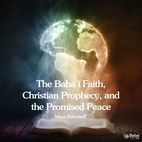The views expressed in our content reflect individual perspectives and do not represent the official views of the Baha'i Faith.
Recently Pope Francis and Muslim leader the Grand Imam of Al-Azhar Ahamad Al-Tayyib came together in an unprecedented gathering in Abu Dhabi to sign the “Human Fraternity Document.”
Some social media posts have been highly critical of this occasion and the resulting document, saying that the Pope and the Grand Imam have conspired to come up with a “novel theological formulation” or that they have somehow betrayed their own Faiths.
But the manuscript, described as “A Document on Human Fraternity for World Peace and Living Together,” invites “all persons who have faith in God and faith in human fraternity to unite and work together so that it may serve as a guide for future generations to advance a culture of mutual respect in the awareness of the great divine grace that makes all human beings brothers and sisters.”
For Baha’is, this document offers humanity a welcome call to a long-overdue conversation, because at the very heart of the Baha’i Faith beats the cry for world unity:
It is binding and incumbent upon the peoples of the world, one and all … that perchance the fire of animosity which blazeth in the hearts of some of the peoples of the earth may, through the living waters of divine wisdom and by virtue of heavenly counsels and exhortations, be quenched, and the light of unity and concord may shine forth and shed its radiance upon the world.
We cherish the hope that through the earnest endeavours of such as are the exponents of the power of God—exalted be His glory—the weapons of war throughout the world may be converted into instruments of reconstruction and that strife and conflict may be removed from the midst of men. – Baha’u’llah, Tablets of Baha’u’llah, p. 22.
This crucial message to the world’s peoples, revealed in 1891 by Baha’u’llah, the prophet and founder of the Baha’i Faith, encapsulates the central Baha’i teaching—world peace through global unity. Shoghi Effendi, the Guardian of the Baha’i Faith, characterized this principle of the oneness of humankind as “… the pivot round which all the teachings of Baha’u’llah revolve.” – The World Order of Baha’u’llah, p. 42.
At the Human Fraternity Meeting, the two leaders from the Catholic and Muslim Faiths—who certainly fit Baha’u’llah’s description as “exponents of the power of God”—discussed human freedom and the fact that the Creator has willed religious plurality: “The pluralism and the diversity of religions, colour, sex, race and language are willed by God in His wisdom, through which He created human beings,” the Document states. This concept of unity in diversity has always animated the purpose of the Baha’i teachings:
Behold a beautiful garden full of flowers, shrubs, and trees. Each flower has a different charm, a peculiar beauty, its own delicious perfume and beautiful colour. The trees too, how varied are they in size, in growth, in foliage—and what different fruits they bear! Yet all these flowers, shrubs and trees spring from the self-same earth, the same sun shines upon them and the same clouds give them rain.
So it is with humanity. It is made up of many races, and its peoples are of different colour, white, black, yellow, brown and red—but they all come from the same God, and all are servants to Him. This diversity among the children of men has unhappily not the same effect as it has among the vegetable creation, where the spirit shown is more harmonious. Among men exists the diversity of animosity, and it is this that causes war and hatred among the different nations of the world. – Abdu’l-Baha, Paris Talks, p. 52.
This divine wisdom is the source from which the right to freedom of belief and the freedom to be different derives. Therefore, the fact that people are forced to adhere to a certain religion or culture must be rejected, as too the imposition of a cultural way of life that others do not accept.The Human Fraternity Document continues:
In full agreement, the Baha’i International Community website introduces the Baha’i Faith by describing how:
Baha’is the world over come from all religious backgrounds: Buddhist, Christian, Hindu, Jain, Jew, Muslim, Sikh, Zoroastrian, animist, and non-religious. Yet they study a common set of sacred writings, observe a unifying code of religious laws, and look to a single international administrative system for continuing guidance.
Their sense of unity goes beyond a shared theology. It is expressed in an abiding commitment to a global program for moral, spiritual and social progress that represents many of the finest ideals of civilization. – www.bic.org
Regarding this progressive, unified view of global citizenship, the Human Fraternity Document declares:
The concept of citizenship is based on the equality of rights and duties, under which all enjoy justice. It is therefore crucial to establish in our societies the concept of full citizenship and reject the discriminatory use of the term minorities which engenders feelings of isolation and inferiority. Its misuse paves the way for hostility and discord; it undoes any successes and takes away the religious and civil rights of some citizens who are thus discriminated against …
The Baha’i teachings have long promulgated this view. Baha’u’llah articulated it back in 1882:
It is not for him to pride himself who loveth his own country, but rather for him who loveth the whole world. The earth is but one country, and mankind its citizens. – Baha’u’llah, Gleanings from the Writings of Baha’u’llah, p. 250.
The Human Fraternity Document goes on to state:
It is an essential requirement to recognize the right of women to education and employment, and to recognize their freedom to exercise their own political rights. Moreover, efforts must be made to free women from historical and social conditioning that runs contrary to the principles of their faith and dignity. It is also necessary to protect women from sexual exploitation and from being treated as merchandise or objects of pleasure or financial gain. Accordingly, an end must be brought to all those inhuman and vulgar practices that denigrate the dignity of women. Efforts must be made to modify those laws that prevent women from fully enjoying their rights …
This admonishment, perfectly aligned with the teachings of the Baha’i Faith, seems almost as if it could be inspired by a 1912 address given by Abdu’l-Baha:
Until the reality of equality between man and woman is fully established and attained, the highest social development of mankind is not possible. Even granted that woman is inferior to man in some degree of capacity or accomplishment, this or any other distinction would continue to be productive of discord and trouble. The only remedy is education, opportunity; for equality means equal qualification.
And let it be known once more that until woman and man recognize and realize equality, social and political progress here or anywhere will not be possible. – Abdu’l-Baha, The Promulgation of Universal Peace, p. 77.
Baha’is around the world have championed this recent interreligious meeting between leaders of Christianity and Islam, viewing it as yet another important step in an indispensable interfaith dialogue for the advancement of human civilization and world peace—and as one of the signs of the advent of a new global civilization brought by Baha’u’llah. Unity and the oneness of humankind comprise the central theme of the Baha’i Faith, as Baha’u’llah so eloquently expressed:
O ye men of wisdom among nations! Shut your eyes to estrangement, then fix your gaze upon unity. Cleave tenaciously unto that which will lead to the well-being and tranquillity of all mankind. This span of earth is but one homeland and one habitation. – Baha’u’llah, Tablets of Baha’u’llah, p. 67.

















Comments
Sign in or create an account
Continue with Facebookor